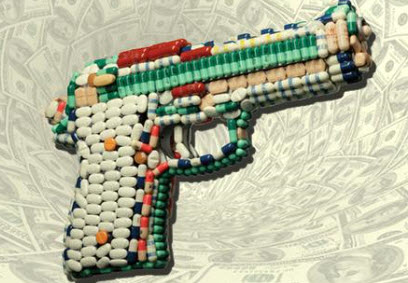– Antidepressants Scientifically Linked to Violent Behavior in Youth:
A new study published in the PLoS Medicine journal has found that younger people taking antidepressants are more likely to commit violent crimes.
Reuters reports that the researchers “used a unique study design which aimed to avoid confounding factors by comparing the same individuals’ behavior while they were on and while they were off medication.” The study was led by Seena Fazel of Britain’s Oxford University.
Fazel’s team used matched data from Sweden’s prescribed drug register and its national crime register over a three-year period. Among 850,000 people prescribed Selective Serotonin Reuptake Inhibitors (SSRIs), one percent were convicted of a violent crime. SSRIs are often prescribed to fight off anxiety and depression and include drugs like Prozac and Paxil.
Most of the age groups did not show an increase in crime and violence, however, the 15-24 year-old group showed a 43 percent increase in their risk of committing violent crime while on SSRIs. The researchers also observed an increased risk for younger people to be involved in violent arrests, non-violent convictions and arrests, non-fatal injuries, and alcohol problems when they were taking antidepressants. The results also showed those who took lower doses had an increased risk of being violent.
Ironically, the researchers recommend that young people might take higher doses of the drugs to reduce the risk of violence and criminal activity. Fazel told Reuters it is possible that younger people taking lower doses are not being “fully treated,” leaving them vulnerable to impulsive behavior.
Fazel cautioned that the study does not conclusively prove SSRIs will lead to increases in violent activity and said further studies should be conducted. He went on to tell Reuters that if the results are confirmed, “warnings about the increased risk of violent behavior among young people taking SSRIs might be needed.”
Anti-Media previously reported on a study by the Harvard School of Public Health that found high doses of antidepressants in teens and young adults correlate to marked increases in self-harm.
That study examined 162,625 subjects between the ages of 10 and 64 for 12 years. For subjects aged 24 and younger, higher-than-average doses of antidepressants doubled the rate of suicidal behavior. In addition, a 2004 review by the U.S. Food and Drug Administration (FDA) also found that antidepressants double the risk of suicides between the age of 18 and 25.
Recently, journalist Ben Swann released a Reality Check report examining the possible connection between gun violence and SSRIs.
“The crime scene tape was still up in Roanoke, Virginia when politicians began calling—almost predictably—for tougher gun control laws,” Swann wrote. “Here’s a question: why is it always a discussion about guns and not about mental health and mood altering prescription drugs?”
Swann goes on to list several examples of shootings committed by individuals under the influence of SSRIs.
“1999: 15-year old Oregon school shooter Kip Kinkel, who opened fire in his school cafeteria, had been on Prozac.
1999: Eric Harris, the Columbine killer, was taking Luvox.
1999: Conyers, Georgia school shooter T.J. Solomon was on Ritalin.
2005: Red Lake Indian Reservation shooter Jeff Weise was taking Prozac.
2007: Virginia Tech shooter Cho Seung-Hui, who shot and killed 32 people, was on antidepressants and taking Prozac.
2012: Colorado theater shooter James Holmes… was reportedly heavily hooked on the prescription painkiller Vicodin. And he took a cocktail of anti-depressants before his shooting spree.
2012: Conn. school shooter Adam Lanza’s uncle said the boy was prescribed Fanapt, a controversial anti-psychotic medicine.”
It would appear that a certain amount of skepticism is necessary when listening to the claims made by members of the pharmaceutical-industrial complex. Studies show antidepressants are overprescribed, and in my own experience with depression and anxiety, I found that doctors are far too often willing to offer pills than have a conversation and work to solve the root causes of these issues.
We need to help promote a culture where individuals are able to safely talk about their depression, anxiety, and even thoughts of suicide. As humans, we have the ability to create a culture that values open and honest communication, respect, and love. This could allow each individual to have a safe space to process their pain and receive the healing necessary for personal growth and collective liberation. Empower each other and break your addiction to Big Pharma.
